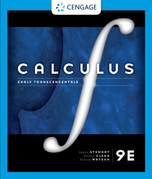Solution Found!
?Which of the following inequalities can be used to show that \(\sum_{n=1}^{\infty} n
Chapter 10, Problem 5(choose chapter or problem)
Which of the following inequalities can be used to show that \(\sum_{n=1}^{\infty} n /\left(n^{3}+1\right)\) converges?
(a) \(\frac{n}{n^{3+1}} \geqslant \frac{1}{n^{3}+1}\)
(b) \(\frac{n}{n^{3+1}} \leqslant \frac{1}{n}\)
(c) \(\frac{n}{n^{3+1}} \leqslant \frac{1}{n^{2}}\)
Questions & Answers
QUESTION:
Which of the following inequalities can be used to show that \(\sum_{n=1}^{\infty} n /\left(n^{3}+1\right)\) converges?
(a) \(\frac{n}{n^{3+1}} \geqslant \frac{1}{n^{3}+1}\)
(b) \(\frac{n}{n^{3+1}} \leqslant \frac{1}{n}\)
(c) \(\frac{n}{n^{3+1}} \leqslant \frac{1}{n^{2}}\)
Step 1 of 3
(a) The given inequality suggests that our series is larger than some other series.
This information cannot be used to prove that a series is convergent We need to show that our series is smaller than a known convergent series.
